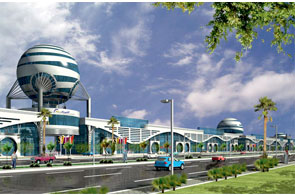 Business & Finance Club Magazine - Real Estate Sector - The first phase of the multibillion-riyal Barwa Commercial Avenue on the Abu Hamour Road is expected to be open to business some six months before the project’s scheduled completion, slated for June 2012.
Work on the mega project is progressing well and on schedule, a source involved in the project said.
“As of today 80% of the “structural buildings” is completed while other trades such as MEP (mechanical-electrical-plumbing), facade and finishes are moving forward as scheduled,” the source said.
According to him, the “contractual finish” of the project is slated for June 2012 but parts of the 8.6km-long complex will be ready six to seven months before the completion date.
“A commercial avenue of this length cannot be handed over in one day and therefore it will be made ready in stages,” the source said.
The mixed-use development will offer about 600 shops and showrooms and 150,000sqm of office space. There will be around 800 “luxury residential units” in one- to three-bedroom floor plans.
Parent company Barwa awarded the main contract to Germany’s largest international construction powerhouse Hochtief in June 2008 when the value of the project was given by officials as QR6.5bn.
“Site preparation (enabling works) began in March 2008 while the contractor started with concrete pours in August of 2008,” the source said.
Barwa Commercial Avenue begins at the Abu Hamour Roundabout and ends across Street 22 in the Industrial Area. Put together, the 206 buildings stretch over 7km out of the total length of the 8.6km project.
“There are five types of buildings and they range in height from four to five floors. Each building is different from the other and embodies modernity with a plaza or a central mall,” the source said.
“Logistically speaking, this is a project of immense challenges. To understand the magnitude, let us visualise about 7,000 people working at the site on a daily basis,” the source said.
The main contractor recently achieved a milestone with 20mn man-hours without a loss-time-incident.
“In a civil project, this is a significant achievement. These figures are usually achieved in the oil and gas sector but rarely in a civil project,” the source said, while adding that most of the items required for the project including under-ground piping, water chilling and steel were procured in Qatar.
“The priority was always for local manufacturers,” he added.
|